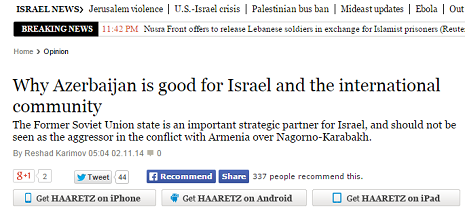Why Azerbaijan is good for Israel and international community

The author of the article reacted to the earlier published article “Israel must not sell arms to the Azeris” (Haaretz, Oct. 26) by Yair Auron in which Auron attempts to mislead the public and forms an opinion about the Armenian-Azerbaijani Nagorno-Karabakh conflict that is far from reality, while clearly undermining the strategic cooperation between Azerbaijan and Israel.
Israel has been among Azerbaijan’s top five trade partners in recent years. Baku is Israel’s top oil supplier, providing about 40 percent of its annual consumption, the author said in his article.
Karimov notes in his article that Azerbaijan has been home to the Jewish community for more than 2000 years, and Azerbaijani Jews enjoy safety, freedom of worship and culture in the country.
"With this in mind, it is sad to see an article such as Auron’s in a popular news outlet," Karimov said.
"First of all, it is of utmost importance that things are called by their names. Nagorno-Karabakh is an internationally recognized part of the Republic of Azerbaijan that is currently under the military occupation of Armenian armed forces, together with seven adjacent regions," he said.
Karimov`s article says the open military phase of the Armenian-Azerbaijani Nagorno-Karabakh conflict saw some of the worst war crimes and crimes against humanity, similar to those perpetrated by Nazis during World War II – but Auron in his article failed to mention that the Azerbaijani side became a victim of aggression; that Azerbaijanis, not Armenians, lived through the horrors of war.
It should be noted that the conflict between the two South Caucasus countries began in 1988 when Armenia made territorial claims against Azerbaijan. As a result of the ensuing war, in 1992 Armenian armed forces occupied 20 percent of Azerbaijan, including the Nagorno-Karabakh region and seven surrounding districts.
The two countries signed a ceasefire agreement in 1994. The co-chairs of the OSCE Minsk Group, Russia, France and the U.S. are currently holding peace negotiations. Armenia has not yet implemented four U.N. Security Council resolutions on the liberation of the Nagorno-Karabakh and the surrounding regions.
"Located at the crossroads of the major trade and energy routes between East and West, and maintaining the secularity of a state with a Muslim heritage, Azerbaijan is a natural bridge between Europe and Asia, and a gateway to energy and transportation corridors for the entire region," Karimov said.
This makes Azerbaijan one of the most strategic states of the Former Soviet Union in terms of both regional and international security, said Karimov.
"Some 30-40 percent of the U.S.-led NATO mission’s supplies to Afghanistan go through Azerbaijan or its airspace," Karimov continues in his article. "Moreover, Azerbaijan offered Kabul help in combating drug trafficking and the insurgency, along with investments in energy and road construction."
“Azerbaijan has a genuinely important role and great potential in the region. The international community has shown a keen interest in Azerbaijan in recent years, expressing significant expectations for the regional leader’s future,” Karimov said.
And within this context, strategic cooperation and understanding between Azerbaijan and Israel – which exists in numerous sectors, including the defense and security spheres, despite multiple attempts to undermine it – is something real patriots should be proud about, not the other way around, Karimov said.














































